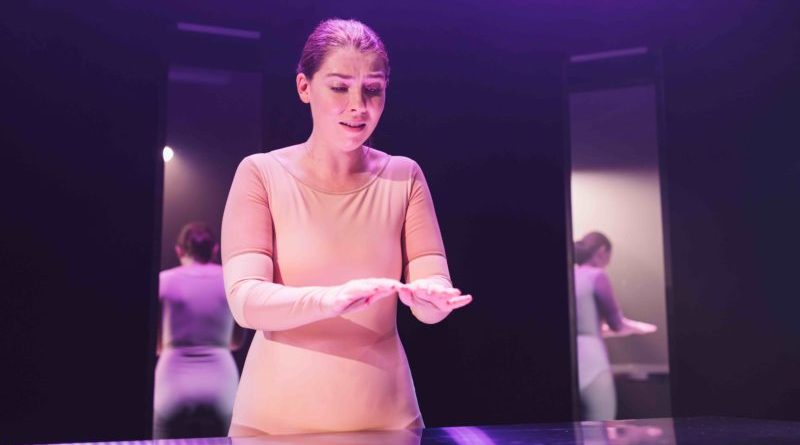INTERVIEW: ‘Dust’ looks at how death changes people
Photo: Dust, written by and starring Milly Thomas, deals with the aftermath of suicide. Photo courtesy of Emilio Madrid / Provided by BBB with permission.
Dust, the new play written by and starring Milly Thomas, continues through Sept. 29 as part of the Next Door series at New York Theatre Workshop on the Lower East Side of Manhattan. The 75-minute drama, directed by Sara Joyce, deals with a woman who dies by suicide and then must watch the aftermath of how her death impacts family and friends.
It’s a startling, emotional evening recommended for theatergoers 18 and over. Dust originated in the United Kingdom, having sold out runs in a number of locations, including London’s West End.
“It started off by Milly wrote to me and said, ‘I’ve got this idea for a play,’ and she had bits of it written,” Joyce said in a recent phone interview. “We sat and had coffee and chatted about it.”
Joyce and Thomas had that conversation, all the while the director was trying to understand the serious topic of the play and the motivations behind crafting this one-woman show.
“She wanted to create something for herself to perform in, and I have a massive admiration for people who want to make their own work and who want to create from the ground up,” Joyce said. “And so I was really inspired and excited by the challenge of that, of starting with nothing or just an idea, and seeing if you could turn it into something.”
Well, Joyce and Thomas have certainly turned Dust into something. Critics have lauded the production for its writing, directing and acting, and the conversations it has sparked at NYTW have been profound, diverse and important.
The director did look at some resources to better understand the issue of suicide, but she also recognized that Dust is a singular narrative. Much of her exploration would happen during rehearsals with Thomas.
“This story is so specifically about this character’s experience of depression and her proximity to suicide, why she decides to take her life, and so a lot of what’s in there is kind of biased toward my and Milly’s feelings about it and also toward creating a very, very specific experience for one character,” Joyce said. “So it was not about generalizing the subject matter but trying to focus in on it specifically.”
Joyce’s motivation was to accomplish just enough with the production so that the audience could fill in the blanks. She used the analogy of coloring books; her and Thomas set up the lines, but it’s up to theatergoers to provide the color.
“I’ve always been really interested in the magic of theater and in creating other worlds,” she said. “So I actually think if anything my style probably was the perfect alchemy with something that required so much.”
Interestingly Joyce’s first love as a child was not with theater, but with film. Her first real experiences with stage performances didn’t come until her teenage years, when she fell in love with musicals, in particular Wicked.
“I wanted to be in Wicked, and that was sort of an obsession,” she said with a laugh. “I liked the playfulness of it, and I was in a theater company as a teenager. And I’ve always read a lot of stories, so I think it’s less about the theater itself and more about storytelling. That really fascinates me, and theater was just the way that I was able to get my hand into it.”
As Dust travels around the world, Thomas and Joyce reshape the narrative slightly, trying to bring a unique production and perspective to audience members who may have different thoughts and backgrounds pertaining to the subject matter.
“I don’t know how noticeable it will be, but it just feels a bit slicker, a bit cleaner, a bit sharper,” she said. “Some of the air that was there has been taken out. … But narratively I feel like the story has to have shifted dynamics for an American audience and for the audience specific to New York Theatre Workshop, so when we do previews, which are the shows before we open to the press, it’s a time for me and Milly and the team to kind of engage with how the audiences are responding. And I guess from that we’ll make little tweaks in terms of thinking, OK, this feels like the sense of humor is kind of on point, or this language might not be totally clear. You look for bits that feel like they’re not reading as well, or maybe are reading really well and you want to take advantage of that, so it feels like it shifted in terms of it feels clearer. It feels like it’s trying to directly talk to an American audience.”
She added: “I don’t feel like we’ve just sort of transposed it from London to America. It feels like we’ve gone, OK, what is this environment? What’s this audience? What is the state of mental health in the States? And we have a consciousness of that, so it carries that energy.”
By John Soltes / Publisher / John@HollywoodSoapbox.com
Dust, written by and starring Milly Thomas and directed by Sara Joyce, runs through Sept. 29 as part of the Next Door series at New York Theatre Workshop on the Lower East Side of Manhattan. Performances take place at the Fourth Street Theatre. Click here for more information and tickets.
Click here for more information about suicide prevention.

